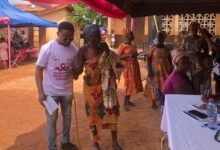SDD-UBIDS introduces social, behavioural change communication course

The Simon Diedong Dombo University for Development Studies, (SDD-UBIDS) has introduced certificate programme in social and Behavioral Change Communication (SBCC) to train prospective communicators in sustainable development communication.
The six-week certificate programme is a partnership programme with the Department of African and General Studies (DAGS) of the university and the United Nations Children Education Fund (UNICEF).
The programme, which is expected to commence this academic year will run on sandwich basis as a “stand-alone programme” that will enhance the communication competencies of prospective students in the area of social and attitudinal change development.
The head of department, Dr Damasus Tuurusong in an interview with the Ghanaian Times in Wa on Wednesday on the role of the university in national development, explained that the programme was targeting service providers in health, agriculture and environmental sciences as well as development workers, such as staff of non-governmental and community-based organisations, communication personnel at public and private institutions and people in leadership positions, among others.
“In 2009, the department mounted the Development Communication Programme as undergraduate and post-graduate programmes to help address the knowledge and skills gap that existed in communication for development at various levels”, he stated.
He indicated that after ten years of training students, a programme audit revealed certain weaknesses in the programme and training of students which included the much dreaded top-down approach to communication as against the much-desired bottom-up approach hence there was the need to re-model the programme to ensure it achieved its purpose.
“In communicating towards behavior change and development, we cannot rely on the top-down approach which mainly focusses on experts sharing their opinions and thoughts with the people at the grassroots without considering the views of the very beneficiaries of the development intervention and so SBCC was introduced to stem the tide and change the approach”, he said.
Dr Tuurusung stated that as a means of addressing the deficiencies in the curriculum, the department sought the assistance of UNICEF Ghana, an aid agency with extensive knowledge and vast experience in both theory and field application of communication for development and said UNICEF responded positively by reviewing the curriculum and proposing the SBCC programme.
“Skills that would be acquired after the training is very much needed to effectively shift social attitudes, structures and norms as well as create enabling environment for positive social change in health, environment and agriculture”, he said.
Dr Tuurusung was confident that the university would continue to initiate programmes that would inspire the nation’s development.
FROM LYDIA DARLINGTON FORDJOUR, WA






